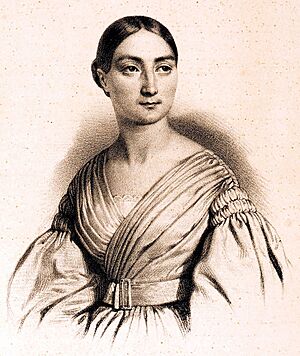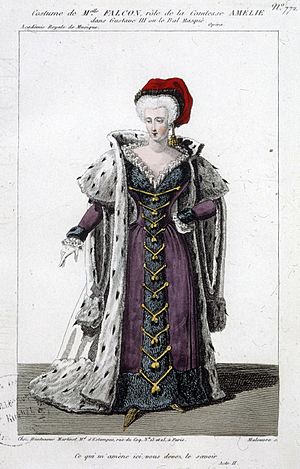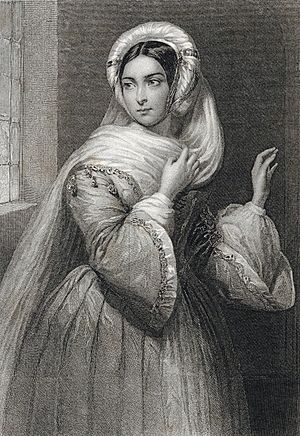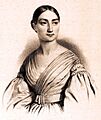Cornélie Falcon facts for kids
Cornélie Falcon (born January 28, 1814 – died February 25, 1897) was a famous French soprano singer. She performed at the important Opéra in Paris. Her biggest success was playing the character Valentine in Meyerbeer's opera Les Huguenots. She had a strong, deep voice and was a fantastic actress. She could sing a wide range of notes, from low A-flat to high D. Cornélie Falcon and another singer, Adolphe Nourrit, helped make the performances at the Opéra much better. The special type of singing roles she was known for are still called "falcon soprano" parts today. Sadly, her career was very short. She lost her voice when she was only 23 years old during a show called Stradella.
Contents
Becoming a Singer
Cornélie Falcon was born Marie-Cornélie Falcon in a place called Le Monastier sur Gazeille, France. Her father, Pierre Falcon, was a tailor. Cornélie was one of three children. Her sister, Jenny Falcon, also became a stage performer.
Cornélie studied at the Paris Conservatory from 1827 to 1831. This is a famous music school. She learned from several great teachers, including Marco Bordogni and Adolphe Nourrit. She won prizes for her singing and vocal skills in 1829, 1830, and 1831.
First Big Performance
When she was 18, Cornélie Falcon made her first big appearance at the Opéra. This was on July 20, 1832. She sang the role of Alice in Meyerbeer's opera Robert le diable. The theater director, Louis Véron, made sure everyone knew about her debut. The opera house was completely full!
Many famous people were in the audience. These included composers like Rossini and Berlioz, and writers like Victor Hugo and Alexandre Dumas. Even though she was nervous, Falcon sang her part perfectly. Her serious acting style and dark looks were perfect for the role. She made a strong impression on everyone watching.
Meyerbeer, the composer, later wrote about her. He said she had a "strong and beautiful voice." He also thought she was a very expressive actress. He decided to write a main role just for her in his next opera. This opera would become Les Huguenots, which was her greatest success.
Other Early Roles
On February 27, 1833, Falcon sang the role of Amélie in Auber's opera Gustave III. However, this part was not a good fit for her serious style. One critic said she sang "without voice, without expression."
Later, she had a chance to shine in a new version of Mozart's Don Giovanni, called Don Juan. She played Donna Anna. Even though she was still a bit shy, her performance was very well received. People liked her even more than they had liked her as Alice.
On May 3, 1834, Falcon sang Julia in a show called La vestale. This performance was a special event for Adolphe Nourrit. Falcon's portrayal of Julia was also very popular.
Working with Berlioz
The composer Berlioz really admired Cornélie Falcon. He asked her to sing in one of his concerts in November 1834. She sang two of his new songs and an aria (a solo song) by Bellini. She was so good that the audience asked her to sing an encore!
This concert was a big success. It also featured Berlioz's new symphony, Harold en Italie. Many famous people like Chopin and Liszt were there. Falcon's singing of La captive was a huge hit. She also sang in another concert with Berlioz in November 1835.
More Opera Roles
Cornélie Falcon created several other important roles at the Opéra:
- Rachel in Halévy's La Juive (February 23, 1835)
- Valentine in Meyerbeer's Les Huguenots (February 29, 1836)
- The main character in Louise Bertin's La Esmeralda (November 14, 1836)
- Léonor in Louis Niedermeyer's Stradella (March 3, 1837)
She also sang as the Countess in Rossini's Le comte Ory and Pamira in Rossini's Le siège de Corinthe in 1836. By 1835, Falcon was the highest-paid artist at the Opéra, earning a lot of money.
Losing Her Voice
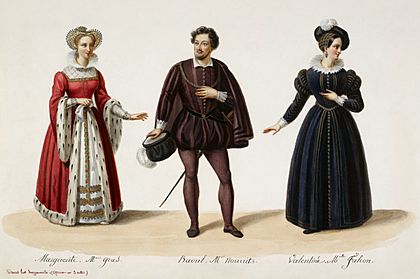
Sadly, Cornélie Falcon's singing career ended very suddenly. During the second performance of Stradella in March 1837, she lost her voice. When another singer asked her a question in the opera, she was supposed to sing "I am ready." But she couldn't. She fainted and was carried off the stage.
Berlioz, who was there, said her voice sounded "raucous" and "whistling." Falcon tried to keep performing, but her voice problems continued. Her last regular performance was in Les Huguenots on January 15, 1838.
She tried many different treatments and even moved to Italy, hoping the climate would help. She came back for a special performance in March 1840. People cheered when she appeared, but her voice was still very weak. She could no longer sing in operas. It was said that she cried because of her voice. She had to retire from the stage.
People have wondered why she lost her voice. Some think it was because the music for grand opera was very demanding. Others believe she started singing in a big opera house too young. Some also suggest it was due to stress from her personal life.
Cornélie Falcon later married a financier and became a grandmother. She lived a quiet life near the Opéra until she passed away in 1897. She is buried in Père Lachaise Cemetery in Paris.
Her Legacy
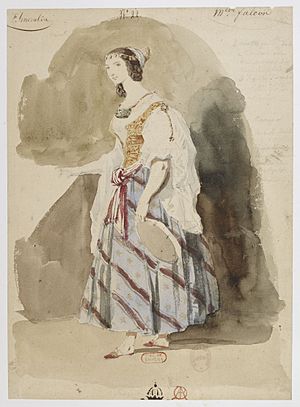
Because Cornélie Falcon sang many important roles in early Grand Opera, her name became linked to a certain type of voice. The term "falcon soprano" describes a dramatic soprano voice that has a strong lower range and a lighter upper range.
One writer described her voice in 1832 as having "a range of two octaves... A silvery voice, with a brilliant sound." He said her voice was strong enough to be heard clearly even over a large chorus.
Cornélie Falcon was also known for her good reputation. This helped people appreciate her performances, especially in roles where she played innocent characters.
A writer named Henry Fothergill Chorley wrote about her in 1844. He said she had "large, dark, melancholy eyes" and a voice that could show strong emotions. He also mentioned the sadness of her losing her voice and her efforts to get it back. Her story was seen as a real tragedy in the world of opera.
Images for kids
-
Falcon (right) as Valentine in Les Huguenots (1836), with Julie Dorus-Gras (left) as Marguerite, and Adolphe Nourrit as Raoul
-
Costume design for Falcon in the title role of La Esmeralda by Louise Bertin
See also
 In Spanish: Marie Cornélie Falcon para niños
In Spanish: Marie Cornélie Falcon para niños
 | Calvin Brent |
 | Walter T. Bailey |
 | Martha Cassell Thompson |
 | Alberta Jeannette Cassell |


